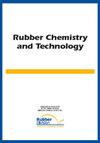不对称可逆加成-裂解转移剂制备乳液SBR对含硅化合物性能的影响
IF 1.5
4区 工程技术
Q4 POLYMER SCIENCE
引用次数: 1
摘要
开发满足燃油效率、牵引力、操纵性能和耐磨性的超高性能轮胎在轮胎行业具有重要意义。溶液SBR由于其有用的特性(例如,窄分散可控的微观结构和链端功能化)而被用作原料。在最近的改进中,乳液SBR(ESBR),一种具有窄分散性的高分子量化合物,已被报道用于轮胎胎面胶中。特别是,S,S-二苄基三硫代碳酸酯(DBTC)可逆加成-碎片转移(RAFT)ESBR在未填充和炭黑填充的硫化胶中表现出优异的耐磨性和燃油效率。然而,由于DBTC RAFT ESBR的对称结构,硅烷偶联剂与三硫代碳酸酯的反应缩短了聚合物链,导致二氧化硅填充硫化胶的耐磨性和燃料效率较差。本研究合成了促进聚合物单向生长的不对称RAFT剂(4-甲氧基苯基)三硫代碳酸苄酯(BMPTC),并将其用于BMPTC RAFT ESBR的聚合。未观察到链断裂。在应用于二氧化硅填充硫化胶时,与DBTC RAFT ESBR相比,BMPTC RAFT ESBR表现出改进的耐磨性(提高了9%)、改进的燃料效率(提高了20%)和改进的湿牵引性能(提高了10%)。本文章由计算机程序翻译,如有差异,请以英文原文为准。
EFFECT OF EMULSION SBR PREPARED BY ASYMMETRIC REVERSIBLE ADDITION-FRAGMENTATION TRANSFER AGENT ON PROPERTIES OF SILICA-FILLED COMPOUNDS
The development of ultra-high-performance tires that satisfy fuel efficiency, traction, handling performance, and abrasion resistance has gained significant importance in the tire industry. Solution SBR has been used as a raw material, owing to its useful characteristics (e.g., narrow dispersity controllable microstructure and chain-end functionalization). In a recent improvement, emulsion SBR (ESBR), a high-molecular-weight compound with narrow dispersity, has been reported for application in the tire tread compounds. In particular, S,S-dibenzyl trithiocarbonate (DBTC) reversible addition-fragmentation transfer (RAFT) ESBR has exhibited excellent abrasion resistance and fuel efficiency in unfilled and carbon black–filled vulcanizates. However, owing to the symmetrical structure of DBTC RAFT ESBR, the polymer chain was shortened by the reaction of a silane coupling agent with trithiocarbonate, leading to poor abrasion resistance and fuel efficiency in the case of silica-filled vulcanizates. In this study, benzyl (4-methoxyphenyl) trithiocarbonate (BMPTC), an asymmetric RAFT agent that promotes unilateral polymer growth, was synthesized and used in the polymerization of BMPTC RAFT ESBR. Chain cleavage was not observed. Upon application to silica-filled vulcanizates, BMPTC RAFT ESBR exhibited improved abrasion resistance (by 9%), improved fuel efficiency (by 20%), and improved wet traction performance (by 10%) compared with the DBTC RAFT ESBR.
求助全文
通过发布文献求助,成功后即可免费获取论文全文。
去求助
来源期刊

Rubber Chemistry and Technology
工程技术-高分子科学
CiteScore
3.50
自引率
20.00%
发文量
21
审稿时长
3.6 months
期刊介绍:
The scope of RC&T covers:
-Chemistry and Properties-
Mechanics-
Materials Science-
Nanocomposites-
Biotechnology-
Rubber Recycling-
Green Technology-
Characterization and Simulation.
Published continuously since 1928, the journal provides the deepest archive of published research in the field. Rubber Chemistry & Technology is read by scientists and engineers in academia, industry and government.
 求助内容:
求助内容: 应助结果提醒方式:
应助结果提醒方式:


